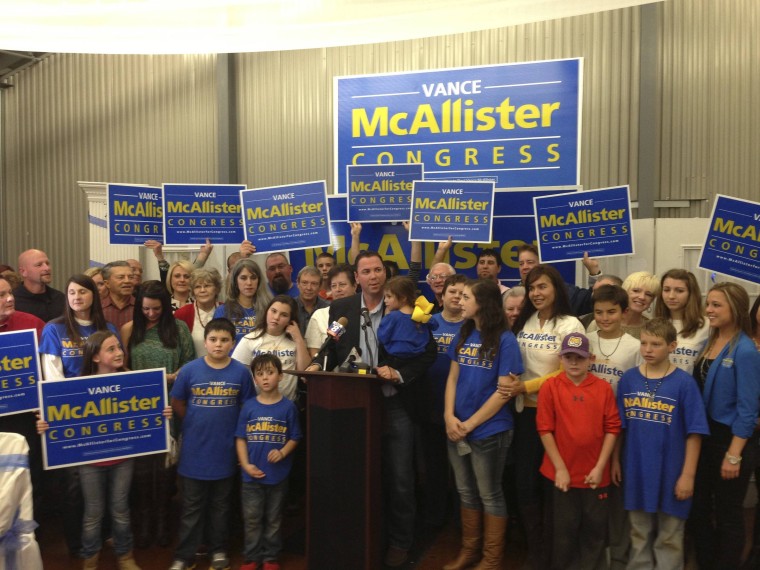When Republican Rodney Alexander resigned from Congress a few months ago, there wasn't any real doubt that his Louisiana district would remain in GOP hands. The only question was which Republican would replace him in Louisiana's ruby-red 5th district.
State Sen. Neil Riser (R) looked like he'd win easily -- he received endorsements from Alexander, House Majority Leader Eric Cantor, the NRA, and nearly all of Louisiana's Republican congressional delegation. But then the votes were tallied in Saturday's run-off election, and Vance McAllister (R), a first-time candidate, crushed Riser by nearly 20 points.
In terms of the national significance, there's one key takeaway from the results.
While some thought the all-Republican runoff would be marked by each candidate running to the far right of every issue, McAllister took leave of the usual party line during a debate last week by coming out in support of optional Medicaid expansion offered under the Affordable Care Act. McAllister said he disagreed with Gov. Bobby Jindal's decision not to accept the expansion because of the economic make-up of the 5th District. [...] Riser blasted McAllister for the admission, issuing an ad stating "a vote for Vance McAllister is a vote for Obamacare."
Exactly. A vote for McAllister was a vote for Obamacare, and in this extremely Republican district, McAllister won in a landslide against the Republican establishment's hand-picked candidate.
In fairness, it's worth emphasizing that Rep.-elect McAllister didn't exactly run as a progressive on health care -- the Republican said he'd prefer to repeal the Affordable Care Act. But he nevertheless stuck to a fairly pragmatic line and told the far-right what it didn't want to hear -- repealing the entirety of the law is unrealistic and Medicaid expansion in Louisiana is a sensible move, even if Bobby Jindal pretends otherwise.
In this district, that was a risky move, and it led Riser and his allies to make the race a referendum over health care. And then McAllister won by about 20 points anyway.
National Republicans would be wise to take note. For many in the party, grunting "Obamacare bad!" is a sure-fire recipe for electoral success. Indeed, GOP leaders have started to think it'll be easy -- tie rival candidates to the controversial health care law, watch voters recoil, and wait for the landslide victories to commence.
Reality seems to be pointing in a different direction. Two weeks ago, Republicans said Virginia's gubernatorial race would be "a referendum on Obamacare," and then Ken Cuccinelli lost. Over the weekend, Republicans said Obamacare would be the deciding factor in Louisiana's congressional special election, but the hardline candidate easily lost a race he was expected to easily win.
And this, by the way, is when support for health care reform is at its nadir. As healthcare.gov improves, and support grows, these electoral referenda will be more difficult for the GOP, not less.
Looking ahead, the party may need a back-up plan.
